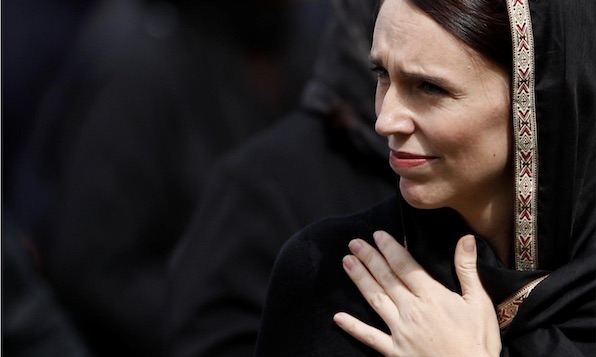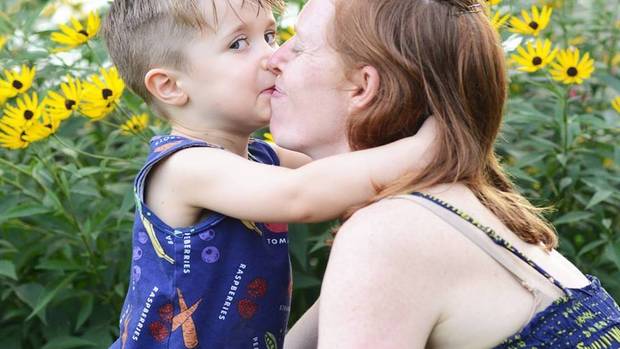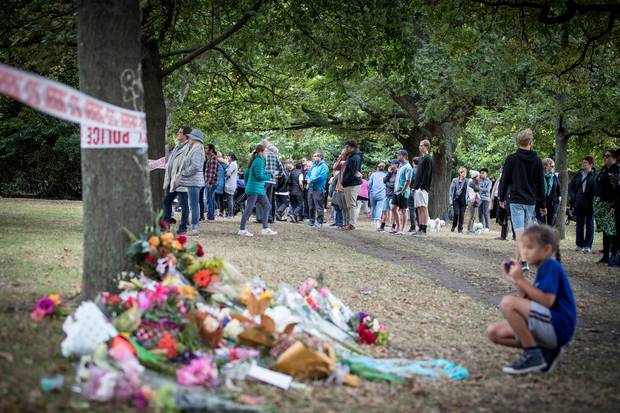
New Zealand Prime Minister Jacinda Ardern leaves after the Friday prayers at Hagley Park outside Al-Noor mosque in Christchurch, New Zealand March 22, 2019. REUTERS/Jorge Silva

Dani Lebo is the wife of Nelson Lebo III, a regular contributor at the Automatic Earth. They are two Americans who have settled in Whanganui on the North Island of New Zealand. Whanganui is over 600 km (400 miles) from Christchurch on the South Island, but that is where Dani found herself last Friday, in the park next to the mosque where most of the victims fell. This is what she wrote about that.
Dani and Nelson named their son after a Neil Diamond song.

Dani Lebo with son Suleiman
Dani Lebo: A week after my son was born, I come across his name in an article in the New York Times. I catch my breath. He is a young man. He is describing the scene after a bomb tore through his village in Afghanistan. He is terrified, he says. He doesn’t know where to sleep. I don’t sleep that night either.
A year and a half later I see my son’s name in our local paper. He arrived six weeks ago from Syria. His brother and sister were killed by a bomb that woke him in the night. He is 5 years old and has already witnessed more tragedy than I will ever see in my lifetime.
Today I say my son’s full name as he giggles and throws himself into my arms. I sing the song that he was named for. He laughs. His shaggy golden hair covers his blue eyes.
“His name means ‘peace’,” I once justified to a Plunket nurse who didn’t even attempt to pronounce it. For some reason I felt the need to explain away her unwillingness to engage in something she saw as “different” or “too hard”. It is uncommon here, but common in the Muslim world. My son shares his name with millions of boys – millions of Muslim boys. Their mothers also named them “peace”.

People gathered to mourn at Hagley Park, Christchurch, last weekend. Photo Michael Craig
And then there I was sitting on the floor of a potting shed in Hagley Park on Friday, March 15, thinking about how relieved I was that my Suleiman, my laughing, smiling, joy of a boy was nowhere near me. Relieved that my Suleiman was safe at home – protected from this scene by 627km and the colour of his skin. And while I was sitting there feeling that relief I was so acutely aware that just a few hundred metres away sat a mother who was, in that very moment, watching her own son die.
In my head I know I was safe that day, but I’m having trouble telling my mind that.
Although I was very close to the shooting, I was never a target. I have run through a few hundred scenarios in my head where the day ends differently – the gunman’s car doesn’t start and he escapes on foot through the park – or he returns to the police cordon after the initial shooting – or his hatred is just slightly less predictable and he decides to spread his terror in a more random direction.
In each of these scenarios he comes to the shed where we were waiting. I try to dismiss these thoughts as quickly as they come, but they are wearing me down. They are wearing me down and I wasn’t even in any real danger. I heard no shots. I saw no blood. My Suleiman was far far away.
I almost didn’t write this column because people are feeling fatigued by this story, by this grief. I am feeling fatigued by my story, by my grief. But I want to let you know how I am feeling. Because you might be feeling this way too one day.
On Friday I spent four hours sitting in a shed in Hagley Park surrounded by uncertainty and fear. Like hundreds of others I waited tensely within blocks of the shooting not knowing exactly where and what was happening.
The fear and sadness and rage I am experiencing this week has given me a glimpse, the smallest tiniest of understanding, of what it would be like to exist in a world of uncertainty and fear.
The world where a man sits near the window when he prays because he is certain that one day he will need to use it as an escape route. And then he does. The world where children are trained in lockdown procedures. The world that our Muslim friends, our black friends, our Chinese friends walk in every day.
My experience that day wasn’t exceptional, and to me that’s an exceptional comment on the state of the world.

• Dani Lebo has a background in international relations and education. She runs The ECO School, an organisation dedicated to accessible sustainability education.









